

Courtesy of Eredus:
“The world is as delicate and as complicated as a spider’s web…
and we’re tearing great holes in it.”
Gerald Durrell
Courtesy of Inspiration Journey:
“To my mind, the life of a lamb is no less precious than that of a human being.
I hold that the more helpless a creature, the more entitled
it is to protection by man from the cruelty of man. ”
Mahatma Gandhi
“All Things Bright and Beautiful” (courtesy of aj paauwe):


I always thought that an unhappy childhood gives a writer ideal material. I learned better after reading Gerald Durrell’s remark:
“If I had the craft of Merlin, I would give every child the gift of my childhood.”
Durrell’s blissfully happy childhood not only provided him with wonderful material for several bestselling books but started him on his life path to a career as a famous naturalist, zoologist, and conservationist. The saga begins in England, in the early 1930s. After the death of his father, Durrell’s unconventional family with their income reduced to a widow’s pension only, moves to the sunny Greek island of Corfu as life there is much more affordable.
Courtesy of Vangelis Koulouris:
Rural Corfu is heaven for an animal-loving ten-year-old boy like Gerry, teeming with exotic birds and various animals ranging from toads, tortoises, scorpions, geckos to porpoises, and a pigeon named Quasimodo. His family, mother, sister, and two brothers are less than thrilled when Gerry starts filling the fridge with his zoological specimens.

In the ‘Speech for the Defence’ that prefaces this witty and beguiling volume of reminiscences, the author reveals that he had intended to write a straightforward natural history of Corfu. ‘But’, he confesses, ‘I made a grave mistake by introducing my family into the book in the first few pages.’ Readers will be glad for his error. Warmly humorous, replete with intriguing natural history, and delighting in the merry eccentricities of the Durrell household, My Family and Other Animals is a splendid trip in very good company.
Danilia, a village in Corfu where The Durrells television series was filmed

“By The Sea” by Eleni Karaindrou (courtesy of Ozan Çoban):
GERALD DURRELL
7 January 1925 – 30 January 1995
Gerald Malcolm Durrell was born in Jamshedpur, India. His father, Lawrence Samuel Durrell was an Anglo-Indian in the sense that his origin was English by descent but he was brought up in India. He studied at the prestigious Thomson Civil Engineering. As an engineer, he was very successful, later becoming the Chief Engineer of the famous Darjeeling Himalayan Railway. When he set up his own company in Sakci, the industrial boomtown of Jamshedpur, his contracts as a contractor included Tata Iron and Steel Works. Like many Englishmen who lived in India for generations, he socialised with Indians of all conventions and castes. On one occasion he gave up his membership at his club when his proposal to include an Oxford-educated Indian doctor who had saved his son’s life, was turned down.
Images of Jubilee Park in Jamshedpur, formerly Sakchi
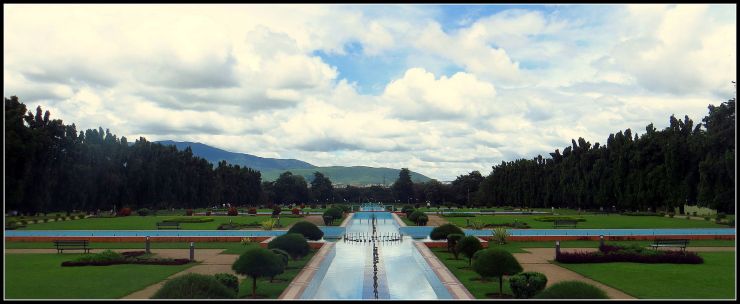
Statue of J.N. Tata, founder of Tata Group and Jamshedpur
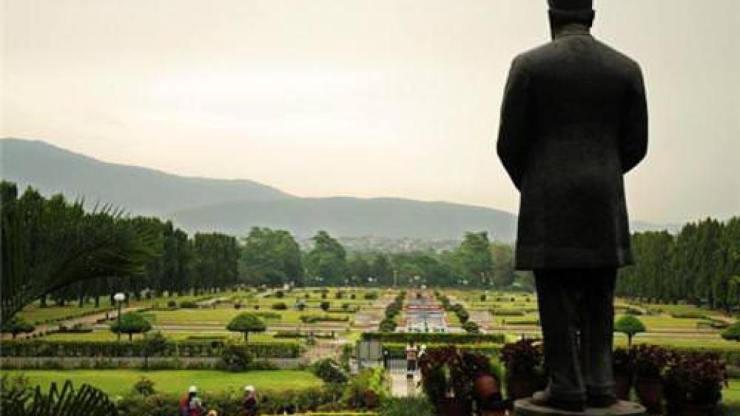
Beautiful landscape outside Jamshedpur

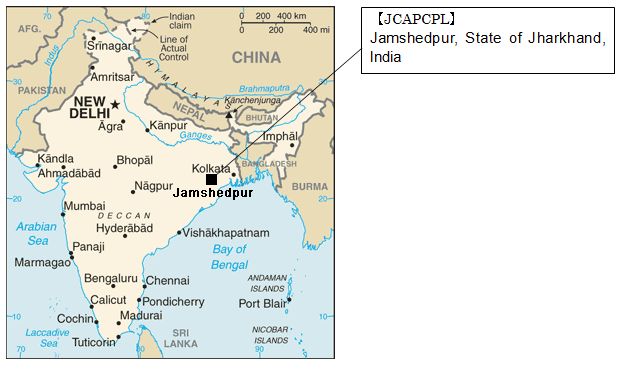
Lawrence and Louisa Durrell, the parents of Gerald
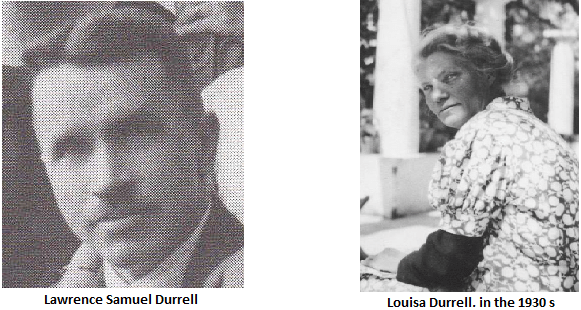

Adagio – “Father’s Theme” by Eleni Karaindrou (courtesy of davesk2):
When Gerald’s father died from overwork suddenly at 43, the family’s life changed dramatically. His widow, Louisa, returned with her children to England. Looking for a less expensive cost of living, she then resettled in Corfu.
The exotic nature of Corfu was greatly inspirational to young Gerry. He was tutored at home by the friends of his brother, Lawrence. At that time, Theodore Stephanides, a friend of one of his tutors, in his own words: “he strolled into my life, tweed-suited, trilby-hatted, his walking stick with its tiny net on the end, a sort of walking hirsute encyclopedia.” The effect of Theodore’s erudition on a budding naturalist of ten was enormous. He became one of Durrell’s greatest friends and mentors, his ideas having a lasting impression on the young naturalist. Together they examined Corfu’s fauna which he stored in numerous places around the house.
Courtesy of ggast82:
The Durrell family lived in Corfu until 1939, and then came back to England just before the outbreak of war.
Theodore Stephanides
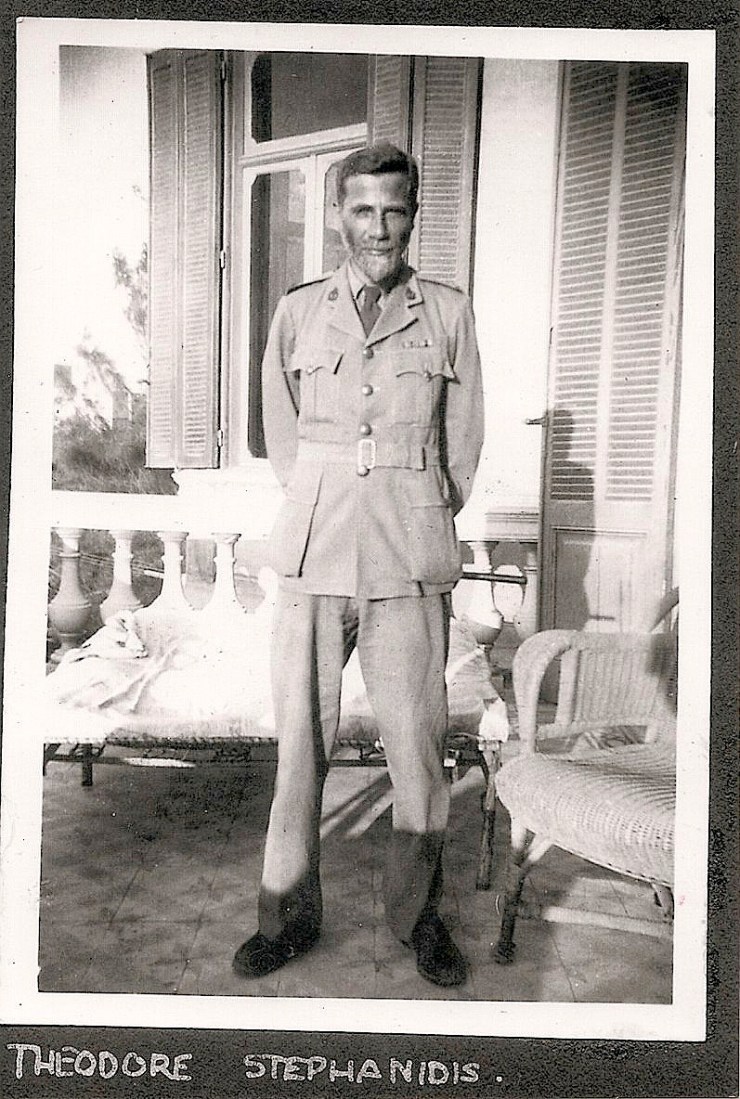
“To xasapiko toy 10” by Eleni Karaindrou (courtesy of Beatriz):
The publication of My Family and Other Animals in 1956, made Durrell a notable author and brought him public recognition as a naturalist. After several unsuccessful attempts, he found a piece of land in Jersey and the island authorities’ permission to build a Zoo. It was going to be devoted to conservation and saving endangered animals. The proceeds from the book allowed Durrell to travel to various places in the world and bring those in danger of extinction to his Zoo. He founded the Durrell Wildlife Conservation Trust there, and it is still in operation now, under prestigious directorship:
Jersey, one of the islands in the English Channel between Britain and France

Jersey Zoo


A tribute from David Attenborough:
Here is an extract from My Family and Other Animals:
THE SPEECH FOR THE DEFENCE
This is a story of a five-year sojourn that I and my family made on the Greek island of Corfu. It was originally intended to be a mildly nostalgic account of the natural history of the island, but I made a grave mistake by introducing my family into the book in the first pages. Having got themselves on paper, they then proceeded to establish themselves and invite various friends to share the chapters. It was only with the greatest difficulty, and by exercising considerable cunning, that I managed to retain a few pages here and there which I could devote exclusively to animals.
The Durrells as depicted in the television series

I have attempted to draw an accurate and unexaggerated picture of my family in the following pages; they appear as I saw them. To explain some of their more curious ways, however, I feel that I should state that at the time we were in Corfu the family were quite young: Larry, the eldest, was twenty-three; Leslie was nineteen; Margo eighteen; while I was the youngest, being of the tender and impressionable age of ten. We have never been very certain of my mother’s age, for the simple reason that she can never remember her date of birth; all I can say is that she is was old enough to have four children. My mother also insists that I explain that she is a widow for, as she penetratingly observed, you never know what people might think.
In order to compress five years of incident, observation, and pleasant living into something a little less lengthy than the Encyclopedia Britannica, I have been forced to telescope, prune, and graft, so that there is little left of the original continuity of events.
It is doubtful if this would have been written without the help and enthusiasm of the following people. I mention this so that blame can be laid in the right quarter. My grateful thanks, then, to:

Dr Theodore Stephanides. With typical generosity, he allowed me to make use of material from his unpublished work on Corfu, and supplied me with a number of dreadful puns, some of which I have never used.
My family. They, after all, unconsciously provided a lot of the material and helped considerably during the writing of the book by arguing ferociously and rarely agreeing about any incident on which I consulted them.
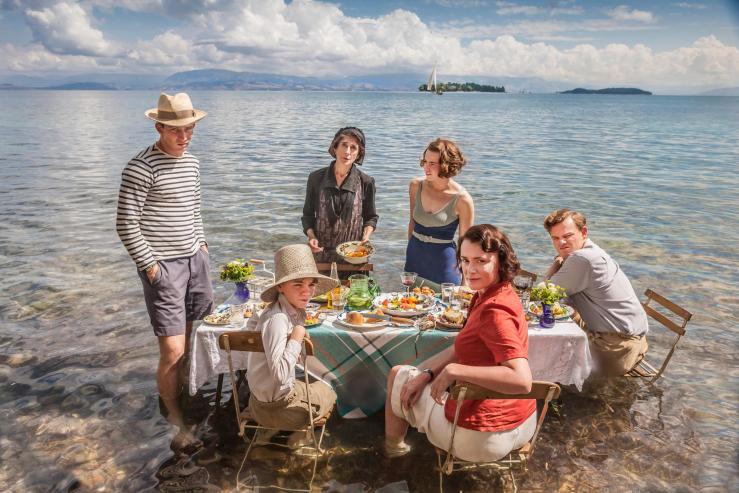
My wife, who pleased me by laughing uproariously when reading the manuscript, only to inform me that was my spelling that amused her.
Sophie, my secretary, who was responsible for the introduction of commas and the ruthless eradication of the split infinitive.
I should like to pay special tribute to my mother, to whom this book is dedicated. Like a gentle, enthusiastic, and understanding Noah, she has steered her vessel full of strange progeny through the stormy sea of life with great skill, always faced with the possibility of mutiny, always surrounded by the dangerous shoals of overdraft and extravagance, never being sure that her navigation would be approved by the crew, but certain that she would be blamed for anything that went wrong. That she survived the voyage is a miracle, but survive it she did, and, moreover, with her reason more or less intact. As my brother Larry rightly points out, we can be proud of the way we have brought her up; she is a credit to us.”
An excerpt from Season 4 of the television series “The Durrells” (courtesy of Masterpiece PBS):
Durrell dedicated his life to the conservation of wildlife. Over his lifetime he wrote thirty-seven books, went on dozens of animal collecting trips, and presented numerous TV shows. He was awarded the OBE in 1982. Told with immense warmth, charm, and humour My Family and Other Animals is a wonderful account of a rare, magical childhood.

“To Vals Tou Gamou” (The Wedding Waltz) by Eleni Karaindrou:
JAMES HERRIOT (James Alfred Wight)
3 October 1916 – 23 February 1995

James Alfred Wight and his wife Joan

The other author I would like to introduce today is a delight to read because of his humour and unusual adventures. His real name was James Alfred Wight and he was a veterinary surgeon in Thirsk, Yorkshire, England.
Countryside around Thirsk

Courtesy of Open Road Media:
Another reason why I have written about him is that his life personified resilience and perseverance. Seventeen publishers rejected his book as “not suitable for adults or children”, and only a chance meeting with an animal-loving agent resulted in his books being published. Now since James Herriot’s books were first published, they have sold millions of copies and delighted generations of readers. Charming, moving, and funny, ALL CREATURES GREAT AND SMALL is a heart-warming, story of determination, love, and friendship from Britain’s best-loved author.
All things bright and beautiful,
All creatures great and small,
All things wise and wonderful,
The Lord God made them all.
Cecil Frances Alexander
1818 – 1895
Another lovely version of “All Things Bright and Beautiful” by The Tabernacle Choir at Temple Square:

.Just out of Glasgow Veterinary College, to the young James Herriot 1930s Yorkshire seemed to offer an idyllic place of rural life in a changing world. Jobs were scarce, and when James was offered the position of a veterinary assistant in the veterinary practice of Siegfried Farnon and his young brother, Tristan, he could hardly believe his luck.

In his first year there, he had to deal with the erratic brothers, the farmers whose language was incomprehensible, the semi-feral cattle, and an overweight Pekingese called Tricki Woo, and Nugent, a piglet, and hundreds of other animals, but now and here, I would like you to read the hilarious story of those two. You will want to read all James’ books after, guaranteed.
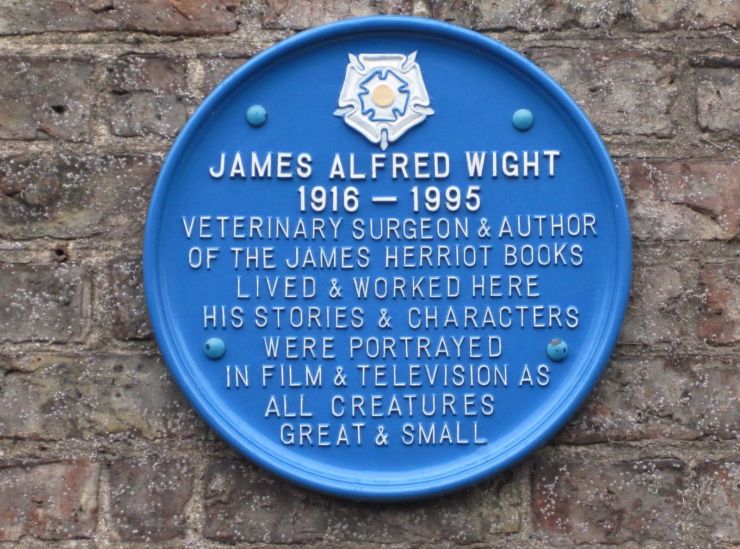

James Herriot country (courtesy of Harry Mateman):
Extract from James Herriot’s book All Creatures Great and Small:
“Will there be a lot of people there?” I asked, shuffling my feet.
Siegfried struck himself on the forehead with his open hand. “Of course, there’ll be a lot of people. What d’you think? Did you expect it would be just you and Tricki? The cream of the county will be there in full regalia but my guess is that there will be no more honoured guest than Uncle Herriot. Why? Because Mrs. Pumphrey invited the others, but Tricki invited you.”
“OK, OK,” I groaned. “I don’t fancy it.”
Before leaving, Siegfried turned round and his expression was grave. “And remember for Pete’s sake don’t write (acceptance letter) to Mrs. Pumphrey. Address your letter to Tricki himself, or you’re sunk.”
Mrs Pumphrey’s home as shown in the television series

I presented myself at Mrs. Pumphrey’s home on the night of February 5th. A maid led me into the hall and I could see Mrs. Pumphrey at the entrance to the ballroom receiving her guests and beyond an elegant throng standing around with drinks. There was a well-bred clamour, a general atmosphere of wealth. Mrs. Pumphrey was smiling sweetly as she shook hands with the couple in front of me but when she saw me her face became radiant. “Oh Mr Herriot, how nice of you to come. Tricki was so delighted to have your letter – in fact, we really must go in and see him now.” She led me across the hall. “He’s in the morning-room,” she whispered. “Between ourselves, he finds these affairs rather a bore, but he’ll be simply furious if I don’t take you in for a moment.”

Tricki was curled up in an armchair by the side of a bright fire. When he saw me he jumped on the back of the chair barking in delight, his huge, laughing mouth bisecting his face. I was trying to fend off his attempts to lick my face when I caught sight of two large food bowls on the carpet. One contained about a pound of chopped chicken, the other a mass of crumbled cake.
“Mrs. Pumphrey!” I thundered, pointing at the bowls. The poor woman put her hand to her mouth and shrank away from me.
“Oh do forgive me,” she wailed, her face a picture of guilt. “It is just a special treat because he is alone tonight. And the weather is cold too.” She clasped her hands and looked at me abjectly.
“I will forgive you,” I said sternly, “if you will remove half the chicken and all the cake.”
Fluttering like a little girl caught in naughtiness, she did as I said. I parted regretfully from the little peke. It had been a long day I was sleepy from the hours in the biting cold. This room with its fire and soft lighting looked more inviting than the noisy glitter of the ballroom and I would have preferred to curl up here with Tricki on my knee for an hour or two.
Mrs. Pumphrey became brisk. “Now you must come and meet some of my friends.” We went into the ballroom where light blazed down from three cut-glass chandeliers and was reflected dazzlingly from the cream and gold, many-mirrored walls. We moved from group to group as Mrs. Pumphrey introduced me and I squirmed in embarrassment as I heard myself described as ‘Tricki’s dear kind uncle.’ But either they were people of superb self-control or they were familiar with their hostess’s blind spot because the information was received with complete gravity.

Along one wall a five-piece orchestra was tuning up; white-jacketed waiters hurried among the guests with trays of food and drinks. Mrs. Pumphrey stopped one of the waiters.
“Francois, some champagne for this gentleman.”
“Yes, Madame.” The waiter proffered his tray.
“No, no, no, not those. One of the big glasses.”
Francois hurried away and returned with something like a soup plate with a stem. It was brimming with champagne,
“Francois.”
“Yes, Madame?”
“This is Mr Herriot. I want you to take a good look at him.”
The waiter turned a pair of sad, spaniel eyes on me and drank me in for a few moments.
“I want you to look after him. See that his glass is full and that he has plenty to eat.”
“Certainly, Madame.” He bowed and moved away.
I buried my face in the ice-cold champagne and when I looked up, there was Francois holding out a tray of smoked salmon sandwiches.
It was like that all the evening. Francois seemed always to be at my elbow, filling up the enormous glass or pushing dainties at me. I found it delightful; the salty snacks brought on a thirst which I quenched with deep draughts of champagne, then I had more snacks which made me thirsty again and Francois would unfailingly pop up with the magnum.
It was the first time I had had the opportunity of drinking champagne by the pint and it was a rewarding experience. I was quickly aware of the glorious lightness, a heightening of the perception. I stopped being overawed by this new world and began to enjoy it. I danced with everybody in sight – sleek young beauties, elderly dowagers, and twice with a giggling Mrs. Pumphrey.
Or I just talked. And it was a witty talk; I repeatedly amazed myself by my lightning shafts. Once I caught sight of myself in a mirror – a distinguished figure, glass in hand, the hired suit hanging on me with quiet grace. It took my breath away.
Eating, drinking, talking, dancing, the evening winged past. When it was time to go and I had my coat on and was shaking hands with Mrs. Pumphrey in the hall, Francois appeared again with a bowl of hot soup. He seemed to be worried lest I grow faint on the journey home. After the soup, Mrs. Pumphrey said: “And now you must come and say good night to Tricki. He’ll never forgive you if you don’t.”
It had been a few hours of luxury and light and I carried the memory back with me to Skeldale House. I got into bed, switched off the light and lay back looking back into the darkness. Snatches of music still tinkled about in my head and I was beginning to swim back to the ballroom when the phone rang.
“This is Atkinson of Beck Cottage,” a faraway voice said. “I ‘ave a sow ‘ere what can’t get pigged.* She’s been on all night. Will you come?” I looked at the clock as I put down the receiver. It was 2 am. And at Beck Cottage, one of the most primitive small-holdings in the district. It wasn’t fair.
I groped my way down the long garden to the garage. It was only two miles out to Beck Cottage. It lay in a hollow and in winter the place was a sea of mud. I left my car and squelched through the blackness to the door of the house. My knock was unanswered and I moved across to the cluster of buildings opposite and opened the half door into the byre. The warm, sweet bovine smell met me as I peered towards a light showing dimly at the far end where a figure was standing. I went inside past the shadowy row of cows standing side by side with broken wooden partitions between them and past the mounds of manure piled behind them. Mr Atkinson didn’t believe in mucking out too often.
Stumbling over the broken floor, splashing through pools of urine, I arrived at the end where a pen had been made by closing off a corner with a gate. I could just make out the form of a pig, pale in the gloom, lying on her side.”
I had to edit at this point to get to the poignant end. After a very difficult delivery, Herriot leaves a contented mother pig with her eight piglets suckling with abandon. Great satisfaction.
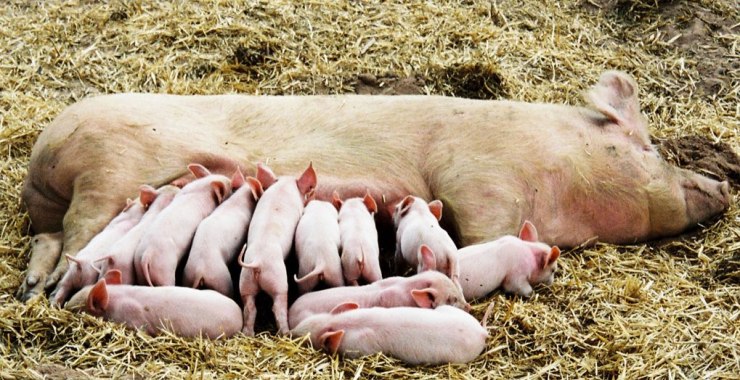
“Yes, I was back and it was all right. I drove through the mud and up the hill where I had to get out to open a gate and the wind, with the cold, clean smell of the frosty grass in it, caught at my face. I stood for a while looking across the dark fields, thinking of the night which was ending now. My mind went back to my schooldays and an old gentleman talking to the class about careers. He said: ” If you decide to become a veterinary surgeon you will never grow rich but you will have a life of endless interest and variety.”
I laughed aloud in the darkness and as I got into the car I was still chuckling. That old chap certainly wasn’t kidding. Variety. That was it – variety.”
* I have a sow here what can’t deliver piglets by herself.
“If I Had Words” performed Lee and Sarah Atkinson (featuring Sam Frazier):
And this is how I imagine Nugent the piglet would look!

An excerpt from the series episode where James attends to Tricki-Woo (courtesy of Screen Yorkshire):
“Finale” from “The Carnival of the Animals” by Camille Saint-Saëns (courtesy of Elena Ya):
PS My readers will have noticed that this week’s post has featured several pieces by Eleni Karaindrou, whose sublime compostions evoke a perfect atmosphere. I would strongly encourage you to explore her work further. Karaindrou has reflected about the sadness in her music: “I express my emotions in my music. Certain things have hurt me, the fact that my mother died when I was seven, the move from the countryside to Athens. As a child I ran barefoot through the forest, the running water, the snow. I’ve lost that. Afterwards came the Greek dictatorship, these are all examples of separation and loss. Yet I do not believe that my music expresses black melancholy. It does not break you. You feel a deeper dimension of life. Maybe nostalgia is a better word to describe it.”
“Nostalgic” by Eleni Karaindrou (courtesy of Re Mix):

Thank you, Stewart, for your lovely comments! I knew that you will enjoy this one, and I like Herriot’s books. I watched all the series and one of my readers went to Yorkshire to meet him and he was
Very charming.
The alarming climate change is proof that we are not listening. Time will tell.
Thank you again, Stewart, much appreciate.
Joanna
LikeLike